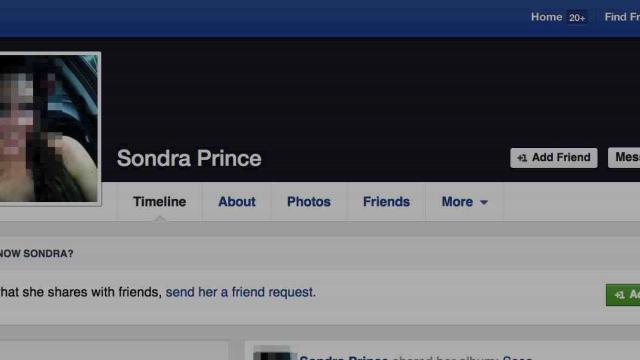An overlooked US Justice Department court filing explains that a federal agent had the right to commandeer a woman’s identity, set up a fake Facebook account using her details and even post provocative photographs of her found on a seized phone. Buzzfeed reports that a Drug Enforcement Administration agent stole the identity of Sondra Arquiett, who then went by the name Sondra Prince, back in 2010.
The site explains how she found out:
[A] friend asked about the pictures she was posting on her Facebook page. There she was, for anyone with an account to see — posing on the hood of a BMW, legs spread, or, in another, wearing only skimpy attire. She was surprised; she hadn’t even set up a Facebook page.
Indeed, the DEA agent was using the account to communicate with suspected criminals. Why Sondra? Well, admittedly, she had been arrested on suspicion of being part of a drug ring, and she was ultimately sentenced to probation. While she was awaiting trial, an agent called Timothy Sinnigen set up the fake account using photographs from her confiscated phone. It worked: he communicated with at least one wanted fugitive.
But success isn’t, perhaps, the point — as Sondra well knows. The whole debacle came to light, in fact, because she has been trying to sue Sinnigen, claiming that her privacy has been violated.
Sadly for Sondra, the court ruled that, while the Facebook page has been constructed without her permission, it was “for a legitimate law enforcement purpose”. A statement explains:
“Defendants admit that Plaintiff did not give express permission for the use of photographs contained on her phone on an undercover Facebook page, but state the Plaintiff implicitly consented by granting access to the information stored in her cell phone and by consenting to the use of that information to aid in an ongoing criminal investigations [sic].”
Somehow, we suspect that wasn’t quite the consent that Sondra assumed she was giving. And that, perhaps, is the problem: the elastic and opaque rules surrounding digital privacy and consent allow law enforcement officials to push their rights to the extreme. Sondra may not have been squeaky clean, but does that mean she shouldn’t have digital privacy? [Buzzfeed]
